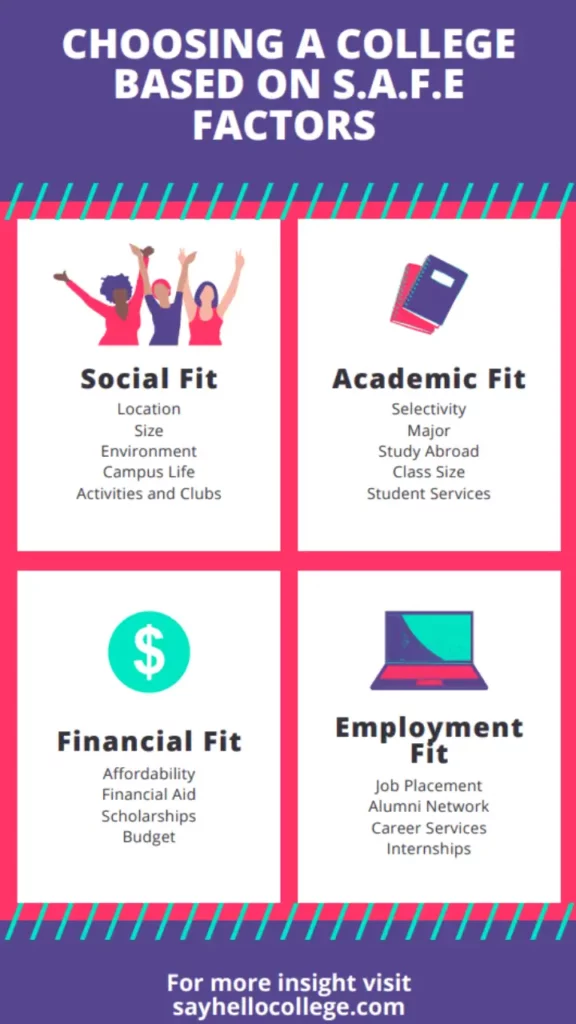As you enter your junior year in high school, your college list may be unfocused with far too many colleges. Most students wind up applying to six to eight schools, and narrowing your list to that range takes self-reflection. You have to be honest in assessing the type of person you are and what you hope to gain from your college experience. In this blog post, we’ll breakdown the four key factors to consider when choosing a college.
What college is right for me and what factors should I consider when choosing a college?
We’ve found that students often are influenced by their parents and peers. They’re not encouraged to ask, “What is it that I want?” So when we meet them, we ask, “What type of learning environment do you want?” There is no right or wrong answer. After all, everyone is different.
We find the first step is sitting down as a family to discuss your wants and needs in college. You must identify what is important to you.
To determine what best suits you—and, in turn, narrow your list down to something manageable and realistic—we deploy a model called S.A.F.E. which includes four key factors to consider when choosing a college. Those are Social, Academic, Financial and Employment fit. Using these four factors when choosing a college will help you determine the schools that are the best overall fit for you.

Social Factors To Consider
College Enrollment Size
If you prefer an intimate classroom setting and personal interaction with your professors, a smaller school will fit the bill. You might have more leadership opportunities at a smaller college. Your impact may be greater at an institution of 1,200 compared to one of 40,000.
Among the appeals of larger schools is that they offer more majors. Big universities are also attractive to kids seeking a robust social setting, one that has, say, a thriving Greek scene or Big Ten football and basketball. We tend to find more extracurricular outlets at larger schools.
Location of the College
Is avoiding the expense of flying back and forth to school a priority? If so, focus on colleges that are close to home. On the other hand, some students are drawn to faraway locales; maybe they love the vibe of the California culture or the natural wonders of Colorado. Other students might seek an urban campus because of everything a big city has to offer, such as abundant internship opportunities.
Our Guide to Choosing the Right College Fit Resource Page has insightful tools to explore additional factors to consider related to S.A.F.E.
Academic Factors to Consider
Academic Majors of Interest
There are schools that are known for particular majors. Purdue, for example, has a superior engineering program. Is journalism your career goal? Then the University of Missouri might be a viable option. Do you want to pursue a degree in economics? Then Miami of Ohio is a possibility.
Are you unsure of a major? That’s okay, too. Find a college that is strong in your general areas of interest, and something will click when it comes time to settle on a major. The key is to study what you love. You’ll get better grades, and you’ll be happier.
You have to be honest in assessing the type of person you are and what you hope to gain from your college experience.
Academic Rigor
It’s important to attend a college that is in your wheelhouse intellectually, even if it may be a notch below another institution in which you managed to be accepted. Do you really want to go to a school where it might be hard to keep up academically with your peers? It can be self-defeating. Some 18-year-olds haven’t yet neared their intellectual peaks. We don’t want them to become frustrated in a setting where they can’t keep up. They’ll be better off at a college where they have the time and space to grow into their potential.
Special Programs
If you’re a student who needs very structured support services, fortify your list with schools that meet this requirement. A number of colleges, such as the University of Arizona, are renowned for programs that are designed around students with learning challenges or learning differences.
Financial Factors to Consider
Cost is obviously a huge factor. Does your family need financial aid? If so, build your list around colleges that will offer you the best financial aid packages. The more selective colleges—as great as they are—often don’t give merit-based aid because everyone who attends also has strong grades and test scores. This can be problematic for middle income families.
How much debt are you willing to incur? We as parents need to do a better job of not allowing massive college loans to put students in debt later. It’s counterproductive for children or parents to be in debt for 20 years after graduation.
Employment Factors to Consider
Last, but certainly not least, is the employment fit. College is all about your future. Your college choice greatly affects your career and earning potential. Here are a few questions to consider when choosing a college for financial fit. How well do students in your major get placed in a job after college? Which companies recruit on campus? Where do alumni often work? What is the average salary out of college in your major?
The presence of a strong alumni network is sure to help you on your path to a strong and lasting career.
As you begin your list narrow it, there are many online search engines you are able to use. We personally like Niche.com because it’s easy to use. Big Future by College Board is also a good site. Regardless, following S.A.F.E. in the factors to consider when choosing a college will help you narrow your list to a set of schools that work for you. It will make the application process much less cumbersome and your actual college experience much more rewarding.
Our counseling team at HelloCollege specializes in helping students build college lists based on their personal interests and circumstances. To learn more about how we can help you identify colleges where you will thrive, contact us for a one-on-one conversation with an admissions expert.








